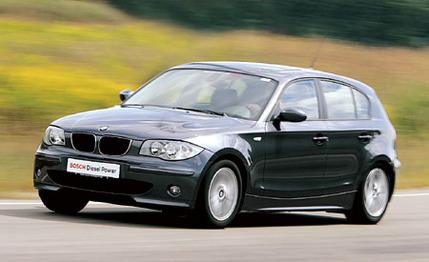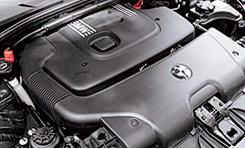
 Mini Test Road Test
Mini Test Road Test
BMW hasn't offered a diesel engine in one of its U.S.-bound cars since the 524td in the mid-80s. So it's no surprise that the company isn't exactly known for oil burners on this side of the Atlantic. In the old country, every BMW model, except for the 6-series, can be had with a diesel. In fact, many Europeans willingly pay extra for a diesel. If you're thinking to yourself, "What kind of person would sully a perfectly good BMW by saddling it with a diesel?" you're not alone. We were more than a bit skeptical about the 1-series diesel that Robert Bosch Corporation dropped off at our Ann Arbor offices.
The thought of a small-displacement diesel doesn't exactly lead to any shoving matches in front of our car board (that's where we hang the keys to our test cars). Nor will a 2.0-liter diesel encourage the road-test editor to arrange to have the car delivered secretly to his home on a Friday to guarantee he will get to drive it all weekend. Clearly, this wasn't an engine we were dying to experience. After all, Volkswagen's 100-horse, 1.9-liter diesel and the formerly available 134-hp, 2.0-liter diesel engine, although fuel efficient, didn't arouse us in any meaningful way. However, the BMW 2.0-liter diesel that arrived in the 120d proved to be a pleasant surprise.
We were unaware that the diminutive diesel had a respectable 161 horsepower and an astonishing 251 pound-feet of torque. This, consequently, is more than can be mustered by the 2.0-liter gasoline engine (147 horsepower, 147 pound-feet of torque) in the 120i. It took about 30 seconds of driving time to realize that the 2.0-liter diesel in the 1-series is actually a performance option.
This 2.0-liter feels about 50 percent larger than the numbers infer as it pulls defiantly all the way to the power peak at 4000 rpm. There's little reason to press on beyond four grand as the thrust tapers off precipitously. At lower revolutions, and after a moment of turbo lag, a party fueled by 251 pound-feet of torque suddenly breaks out at 2000 rpm. The torque hits hard and arrives suddenly, like a phone tossed to you by a disgruntled Russell Crowe. The narrow 205/55R-16 Michelin tires don't have a chance of reining in the bum's rush, and they end up screeching until the traction control dials back the throttle. Acceleration to 60 takes 7.1 seconds, with the quarter-mile arriving in 15.6 seconds at 89 mph. The 5-to-60-mph time takes a bit longer, 8.4 seconds, as the rolling start doesn't allow the car to be brake-torqued (in which, from a stop, one's left foot holds the brake firmly as the right increases throttle), which effectively eliminates turbo lag.

 Our 120d came with an excellent six-speed automatic. It's a torque-converter automatic, as the 120d doesn't offer the sequential-manual gearbox that jerks you around like a used-car salesman. The automatic makes the most of the 120d's power, is quick to downshift, and has a manual override if you think you can do better.
Our 120d came with an excellent six-speed automatic. It's a torque-converter automatic, as the 120d doesn't offer the sequential-manual gearbox that jerks you around like a used-car salesman. The automatic makes the most of the 120d's power, is quick to downshift, and has a manual override if you think you can do better.
Many of us hadn't driven the not-sold-here 1-series, and we were pleasantly surprised by this least expensive BMW. It's interesting to note what the 120d doesn't have compared with its more expensive stablemates. Absent are such things as active anti-roll bars, electronically adjustable damping, active steering, radar cruise control, the aforementioned gearbox, and of course the exasperating iDrive, which rivals HAL 9000 for its love of human input. We didn't miss any of these and in fact celebrated their absence. What the 1-series does have is a remarkably rigid structure, easy-to-use controls, strong brakes, fleet-footed acceleration, precise steering, and entertaining handling. Those are the traits that put BMW on the map, and they are all there unfettered by electronic second-guessing. Add the torquey and efficient diesel (we got 27 mpg over 350 miles), and you have a $25,000 BMW that is closer to the Ultimate Driving Machine ideal than BMWs costing twice its price.